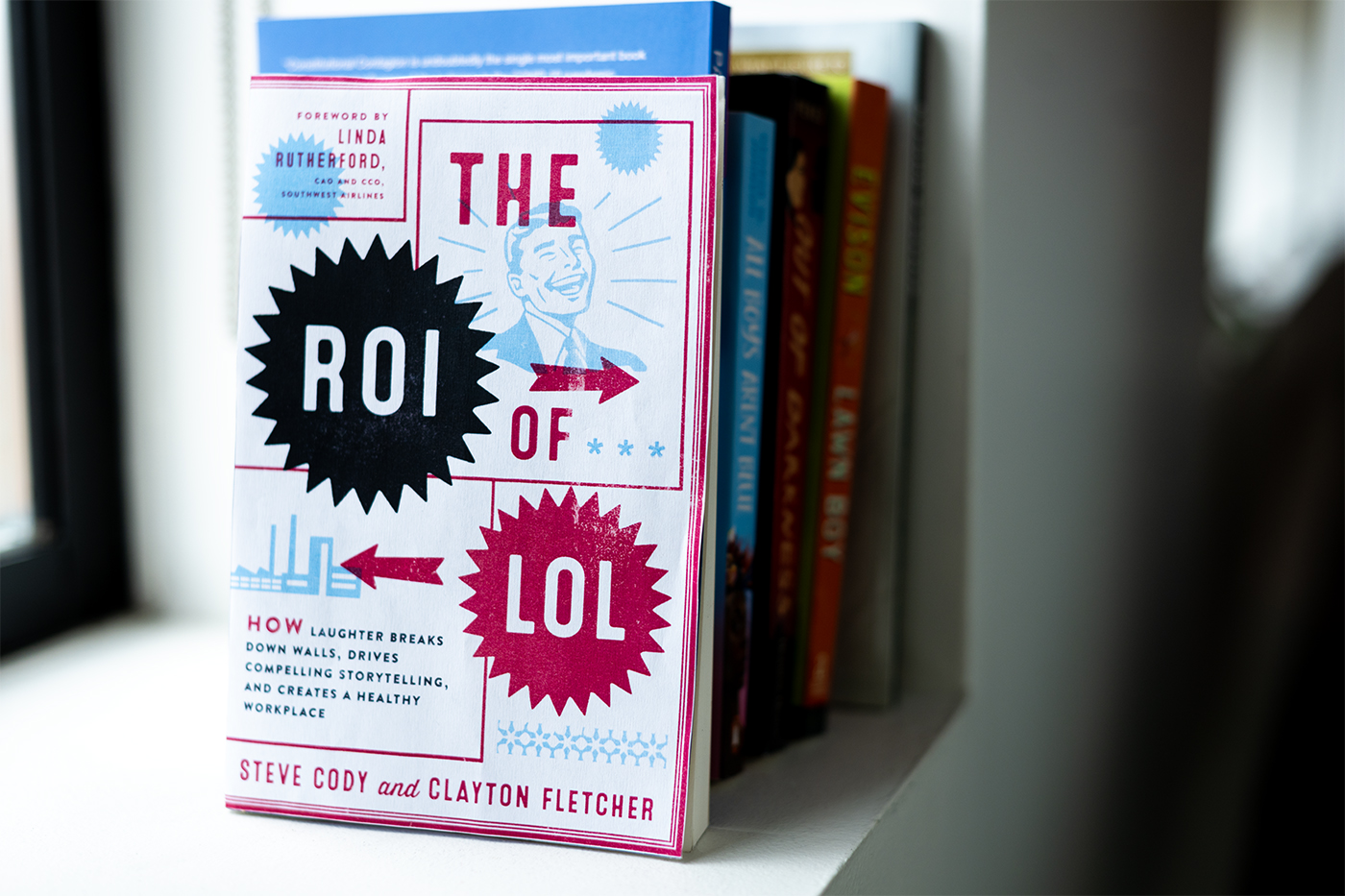Published on
Humor is key to business success, says PR firm CEO who spent years on the stand-up comedy circuit
Steve Cody, CEO of Peppercomm and a Northeastern University alum, says stand-up comedy has given him the skills to be a better manager and dealmaker.

“There are a lot of CEOs in the PR world who take themselves far too seriously,” says Steve Cody, founder and CEO of public relations firm Peppercomm.
On the surface, the 1977 Northeastern University graduate might look like any number of suit-wearing executives, but he knows a thing or two about the value of a good laugh. Cody has decades of experience in public relations, having gone from vice president of Hill+Knowlton to founder of his own firm in 1995, but he also has spent years on the New York City stand-up comedy circuit.
The stand-up stage and C-suite offices of a major New York City public relations firm might seem like completely different worlds, but Cody says laughter and humor have an essential role in the workplace. For years, Peppercomm employees have been participating in stand-up training, not just because it’s fun but because it makes them better at their jobs.
“It’s all about self-deprecating humor, being willing to laugh at yourself and show vulnerability and empathy and support,” Cody says. “All of those intangibles come along with the stand-up and improv training.”
Peppercomm is a case study in what Cody aims to convey in his new book, “The ROI of LOL,” which he co-authored with comedian Clayton Fletcher. He wants to make the case for humor as a valuable asset for any business, CEO or workplace in a world where it’s consistently undervalued.
It’s certainly been central to Peppercomm’s success––and Cody’s.

His decades-spanning public relations career started at Northeastern, where he studied journalism. Cody still says his co-ops at the New York Times and CBS News Radio were some of the most valuable work experiences he’s had.
“They showed me what I wanted to do and what I didn’t want to do,” he says. “I really thought I wanted to be the next Woodward or Bernstein. Getting the chance to work at the New York Times and CBS News Radio and do my own stuff with a Greenwich radio station, I loved news but I did not care for the world-weariness of journalists.”
One day, Cody admitted his misgivings about a career in the newsroom to professor Bill Kurtz, who recommended he look into public relations. Cody barely knew what PR was, but he did his homework and, thanks to some connections from his co-ops, landed a job at what was then the largest public relations firm in the world, Hill+Knowlton.
Cody immediately connected with public relations work, which was good since his bosses threw him into the deep end right away.
During his first day on the job he had to fly down to Washington, D.C., to meet with Uniroyal, a major tire manufacturer and client of the firm, and sit in on the company’s board meeting. As a fresh-faced 21-year-old Northeastern graduate, Cody was the youngest person at the firm by 10 years. He was quickly given a nickname: “The Kid.”
He spent three years at Hill+Knowlton before leaving to work for a mid-sized agency, Gletzer & Company, run by a husband-and-wife team. There he worked with major clients like Sony––and met the woman who would become his wife.
Cody later returned to Hill+Knowlton, working his way up to vice president and eventually working for parent company J. Walter Thompson. Then in 1995, he set out on his own.
“I said I don’t want to be 65 one day, look back and say, ‘What if? What if I’d started my own business?’” Cody says.
Cody’s vision for Peppercomm was a firm that combined the creativity, well-run operations and employee engagement of the leading public relations firms. He also wanted to foster a workplace culture that was welcoming and inspiring, avoiding the pitfalls of his earlier journalism experiences.
Getting Peppercomm off the ground wasn’t easy, and Cody admits he didn’t expect the company to last more than six months.
He was wrong, but the key to the company’s success, on top of Cody’s skill and knowledge of the public relations landscape, might have come down to spelling.
Cody named the firm, originally called Peppercom, after his late black lab, Pepper. He also started it around the same time as the dot-com boom.
“I start getting publicity in the PR trades about Peppercom, and all of a sudden the phones start ringing off the hook with well-funded dot-com firms assuming that Peppercom handled technology, which we didn’t,” Cody says. “But I immediately started hiring people who understood technology. That’s what gave us the initial boost, and by ’98 or ’99 back-to-back we were the fastest growing PR firm in the country, according to O’Dwyer’s, which is one of the top trades.”
It also helped that Peppercom was able to land high-profile clients like Ernst & Young and General Electric early on. Those successes helped support the firm when, by 2000, the dot-com bubble had burst and Peppercom lost 35% of its business. Cody used the market shift as an opportunity to completely reposition the firm, focusing more on corporate and consumer clients and less on technology.
He also added an extra ‘m’ to Peppercomm “to make sure nobody thought we were dot-com.”
Since then, Peppercomm successfully endured the 2008 market crash, a “brutal business divorce” with Cody’s former partner and the COVID-19 pandemic. Along the way it picked up bigger clients and more accolades.
“When you’ve made a contribution and you know the publicity that you’re generating is helping to move the needle in the positive direction, that’s an amazing feeling,” Cody says. “That’s what makes it really special for us: working really closely with a client organization to help them make the world just a little bit better.”
Now, the firm is halfway through a three-year earn-out acquisition by Ruder Finn. Cody says the deal has allowed Peppercomm to remain independent while providing new opportunities to the firm and its employees.
But for Cody, the most meaningful measure of success was when Peppercomm was named New York City’s top workplace by Crain’s in 2012. Peppercomm has landed on the list several other times since then, but Cody says the 2012 win was inspiring and spawned the office’s 2013 rallying cry “Nowhere to go but down.”
Peppercomm’s workplace culture is exactly what Cody wanted when he set out to start the firm, in no small part thanks to his experience as a stand-up comic.
Cody is a natural comedian. A smile is never far from his lips, and he is as likely to deliver wry, self-deprecating jokes as he is savvy business advice––if he’s not doing both at the same time.
But he wanted to hone those skills through a kind of stand-up boot camp put on by the American Comedy Institute, which culminated in his stand-up debut at Stand Up NY. There he caught the attention of Fletcher. The comedian asked Cody to join his show at the New York Comedy Club, and for the next two years, Cody wasn’t far from the stage.
“I was dealing with everything: silence, objections, drunken bachelorette parties in the back, you name it,” Cody says. “I never rose above my personal motto, which is ‘expect less.’ I reveled in the mediocrity, but I was getting some laughs.”
At the same time, he started noticing his skills as a business communicator were getting better. He was improving as a listener and had an easier time turning around a meeting if it wasn’t going his way.
Eventually, Cody put two and two together and asked Fletcher to help him hijack a management retreat and put his team through stand-up training.
“If looks could kill, I wouldn’t be here,” Cody says of his team’s response. “But they all did it, and once they’d gone through it, they all said we have to roll this out to the entire agency, which we did and which we’ve been doing ever since.”
“It allows us to learn new things about each other and find commonalities,” he adds. “All sorts of new bonds were being created as a direct result of the stand-up and improvisational comedy.”
It’s also a great litmus test during the recruitment and business development processes, helping the firm get an immediate feel for whether prospective employees or clients are a good fit for Peppercomm. Cody has even tied stand-up into the company’s annual charitable gift giving, kickstarting a holiday charity drive where employees, and even some clients, craft and perform their own stand-up sets.
Cody has climbed a lot of mountains to get where he is. In his case that’s not only figurative: Cody has climbed three of the Seven Summits, the highest mountains on each continent. It’s why he acknowledges that his humorous approach to business starts and ends at the top.
“I feel that self-deprecating humor in particular really humanizes whoever the leader is,” Cody says. “If she or he is willing to make fun of herself or himself, it really lowers the stress levels and makes it OK for everybody else to inject self-deprecating humor. It’s a muscle that everybody should learn to use in some way, shape or form.”
Cody Mello-Klein is a Northeastern Global News reporter. Email him at c.mello-klein@northeastern.edu. Follow him on Twitter @Proelectioneer.





